- Home
- Gregory Ashe
Hazard and Somerset Off Duty
Hazard and Somerset Off Duty Read online
HAZARD AND SOMERSET: OFF DUTY
HAZARD AND SOMERSET SHORT STORIES
GREGORY ASHE
This book is a work of fiction. Names, characters, places, and incidents either are products of the author’s imagination or are used fictitiously. Any resemblance to actual events or locales or persons, living or dead, is entirely coincidental.
Copyright 2019 Gregory Ashe
All Rights Reserved
TICKETS TO THE GUN SHOW
This story takes place before Guilt by Association.
I
JANUARY 14
SUNDAY
11:47 PM
THE AIR IN THE Pretty Pretty was thick with body spray, sweat, and friction.
“I need a break,” Hazard said, peeling himself off Nico, his lips swollen, his crotch aching dully, and the three Old Fashioneds making him horny as hell.
Nico tossed his shaggy hair, pecked Hazard on the cheek, and kept dancing. He was hot, he was young, and he was a damn good dancer. As soon as Hazard split off from his boyfriend, the gay boys on the Pretty Pretty’s floor mobbed him. Hazard didn’t like it.
The fire door at the back of the club was propped open with an empty paint can marked Origami White, and Hazard knew this was some sort of code violation, but he was grateful for an escape into the brittle, quiet cold in the alley. The droning bass from the club hummed in his ears. He raised his arms like chicken wings, and winter bit into the sweaty pits of his shirt.
Why hadn’t Nico come with him?
From down the alley came another sound: rattle, rattle, rattle. Hiss.
The air was dry, and each breath sucked moisture from the inside of Hazard’s mouth. Dirty snow puffed up as he walked towards the noise. His foot caught a twisted red jockstrap, and that puffed up too before it smacked into the alley wall. Guys didn’t just come out here for fresh air.
Around the corner, a dead security lamp hung out over the alley. Glass from the bulb sparkled on top of the dead snow. Three figures made a triangle in the shadows: one laughing, one smoking—the tip of his cigarette the same color as the dirty jockstrap—and one shaking a can of spray paint.
“Get lost,” Hazard said. “Before I arrest you for vandalism.”
One stopped laughing. One stopped shaking the can. But the third drew deep on the cigarette, and for an instant it was a hell of a lot angrier than the dirty jock.
“Go on,” the one with the cigarette said, and the other two beat it.
The ember wagged through the darkness, and then he was close enough for Hazard to make out his features. Redgie Moseby had a neck like a bull. Fuck that, he had just about everything like a bull, and he was damn near as stupid. He was Wahredua FD, and the last time Hazard had seen him, his partner had popped Moseby in the nose for making a crack about Hazard.
“What are you doing around here?” Moseby said, punching the cigarette towards the Pretty Pretty.
“I’m a fag. I’m looking for ass. What are you doing here?”
Disappointment tightened Moseby’s face. He’d been wanting to be the first one to lob that word.
“You’re pretty stupid, Moseby, so I’ll ask you another way: are you looking to fuck or be fucked?”
“I’d watch my mouth. A guy like you, out in the line of duty. Bad shit can happen. You and that shitbag of a partner. You’d better watch yourselves.” His hand drifted under his nose as though remembering the punch. “You’d better watch your asses.”
“Bad shit happens to firemen with horseshit brains who go around vandalizing buildings and committing hate crimes.”
“Me? Jesus, I was just walking by. I was trying to stop those guys.”
“Get lost, Moseby.”
“Get fucked, Hazard.”
“That’s kind of the whole idea at this place, you moron.”
II
JANUARY 15
MONDAY
10:30 AM
YOU HAD ONE FIGHT.”
Hazard cradled the phone against his shoulder as he made the turn, ignoring his partner-slash-roommate’s words, and pulled into the Wahredua Police Department parking lot. The cherry-red VW—well, it had been cherry-red at one point, at least—stuttered and gasped as he maneuvered it into a parking spot.
John-Henry Somerset, who went by Somers, wasn’t going to give up that easily. “You had one tiny little fight. You don’t need to blow it all up because of one fight.”
“I’m here. I’ve got to go.”
“Don’t be petty.”
“I’m not petty.”
“You’re working on our day off because you’re mad at your boyfriend. That’s petty.”
“I’m going now.”
“Hey, wait.” For a moment, the only noise was the VW’s gasping clanks. Then Somers said, “Can you pick up the tickets for me?”
“What tickets?”
“That concert. I’m going with Cora. I’ve talked about it like ten times. Black Hats White Guns.”
Somers had talked about it ten times. Maybe twenty. Maybe fifty. So many damn times that Hazard refused, on general principle, to acknowledge it anymore. And it had nothing to with jealousy. It had nothing to do with the fact that Somers was—
—taking his ex-wife on a date—
—going with Cora. That was juvenile armchair psychiatrist bullshit. Hazard was just sick of hearing about it. That was all.
“I don’t know.”
“What do you mean you don’t know? You don’t know what? Never mind.”
“Just tell me where to pick them up.”
“No. I’ll do it myself.”
Hazard ran through what he knew about Somers, his mind churning through the analysis. “They’re in your desk.”
“Great guess. You’re a genius.”
“In the top drawer on the right.”
Sullen silence.
“Behind the pencil organizer, under the candy bars that you think I don’t know about.”
“I hate you sometimes.”
“I’ll get them.”
“You’re not off the hook. You’ve got to make things up with Nico. Just because he disappeared for a few minutes—”
“Half an hour, Somers. He was gone for half a fucking hour.” Hazard jerked the keys from the ignition, and the Jetta gave a last, pathetic whine and died. “I’ll see you this afternoon. With the tickets.”
“You just need to do something nice to show you want to make up. You could—”
Hazard disconnected the call, and a moment later, a poop emoji flashed on the screen. He dismissed that too.
When he got inside, he passed Jim Murray at the front desk, crossed the bullpen, and opened the top right drawer of Somers’s desk. Inside, behind the pencil organizer, he found two king-sized Butterfingers and an almond Snickers.
But he didn’t find the tickets.
III
JANUARY 15
MONDAY
10:39 AM
HAZARD KNEW THAT he hadn’t made a mistake. And he knew that Somers hadn’t lied. The only conclusion, therefore, was that the tickets had been taken.
That part of the analysis blitzed through his mind, below the level of conscious thought. Drawing his hand from the drawer, he turned slowly, taking in the bullpen and the larger confines of the station. Everything looked the same: the coffee burned in the pot, the fax machine lights scrambled and flashed, and Derek Jensen was cuffed near booking, where he usually ended up during a three-day weekend binge.
Hazard made his way to the front desk, where Murray had his nose in the Wahredua Courier—all the local news you could stand about noisy chickens and fox runs and the neighbor’s stinking garbage. Occasi
onally something more important, too. Maybe some real big news, like when the B health rating dropped at Grandma Gunnison’s Buffet.
“Murray.”
The old man squeezed his head deeper between the pages.
“I’ve got a question.”
Murray gave the paper a shake, as though the rustling might cover up Hazard’s voice.
Grabbing the pages, Hazard yanked them down so that he and Murray were eye to eye. Murray had been with the department somewhere around fifty years. His nose hair was proof; he hadn’t ever trimmed it, and it came damn close to doubling as a mustache. He didn’t like Hazard, and he didn’t make any bones about it.
“Who came in today?”
“Who came in today? What do I look like, the Marriott concierge? It’s the end of a long weekend. Some of the guys are pulling doubles so you can have the day off. We’ve got folks in and out of here every hour of the day and you want to know who came in.”
“You keep the log, don’t you?”
Murray tried to pull the paper up. Hazard yanked it back down.
“Anybody strange?”
“Now what the hell is that supposed to mean? They caught Derek over there naked and baying like a hound in the Jessup’s potato patch. Is that strange enough for you?”
“Anybody go into the bullpen? Anybody go through Somers’s desk?”
“What do I have? A periscope? I can’t see around walls, you know.”
Swearing, Hazard let go of the paper, and Murray raised it with an indignant shake of the pages. Hazard made his way back to the bullpen and took a deep breath. All right. Somebody had been in here. Somebody had taken the tickets from Somers’s desk. So think, he told himself.
It had to be somebody that blended in to some degree. Murray was old and dumb as a bag of rocks, but he had fifty years on the force, and he treated the station like it was his home. He didn’t like strangers coming in and poking around, and periscope or no periscope, he had an uncanny way of knowing what people got up to.
That left two options: either the thief was a cop, or he was somebody the cops trusted. It wasn’t a cop; Hazard ruled that possibility out. The men and women of Wahredua PD didn’t particularly like Emery Hazard. They trusted him, and they respected him, but they didn’t like him. Somers, on the other hand, was a different story. Somers was everybody’s best friend. He was the golden boy, the perfect cop, the town hero. A cop might have taken the tickets to play a prank on Somers, but nobody on the force would have stolen them. And if it were a prank, it would resolve itself quickly, without Hazard’s intervention.
That left a dwindling number of people. City employees from various branches occasionally visited the station, but they were viewed by the cops with a mixture of disdain and pity. Civilians came every day, but they were watched carefully. Arrestees and convicts came through the station, too, and they were always handcuffed or put in the holding cells.
But someone in uniform, Hazard thought. Someone in uniform with a plausible reason to visit. Someone like a fireman who had worked arson scenes with the Wahredua PD before.
With fresh eyes, Hazard re-examined the bullpen and realized not everything was the same. Somers’s chair had been moved, pushed slightly out from the desk. The keyboard was closer to the monitor, as though someone with longer arms had shoved it back. The screen was angled for someone taller than Somers. Then he checked his own desk and saw similar signs that someone had rifled the drawers.
“That piece of shit.”
He hurried back to Murray and tilted the pages with a finger. Murray’s nose hairs quivered with annoyance.
“Did Redgie Moseby come in?”
“Will you leave me alone if I tell you?”
“He did, didn’t he?”
“I just want to read my paper. That’s not so much to ask.”
“What time?”
“For the love of—I don’t know. Eight. Eight-thirty. He dropped something off and left.”
“That piece of shit,” Hazard said again.
IV
JANUARY 15
MONDAY
12:14 PM
REDGIE MOSEBY LIVED in a doublewide trailer on the south side of the city, along a swampy stretch of ground that butted up to the Grand Rivere. It wasn’t a trailer park, but most of the homes out this way were prefabricated or doublewides, and even in that company, Moseby’s looked like shit. Aluminum siding peeled back from one corner like the trailer was a sardine can. In the front window, Moseby had hung a Confederate flag, an NRA sign, and a camo jacket with ammo glittering in the open pockets. The man probably didn’t even know he was a walking stereotype.
Hazard’s phone buzzed. It was Somers, and Hazard considered not answering it. That might have been suspicious, though, so he swiped the screen.
“How’s work?”
“I’m busy.”
“Did you get the tickets?”
“Jesus, Somers. Do you really think it’s that hard for me to open a drawer?”
“You’re tense.”
“I’m busy. What do you want?”
“I’ve been thinking about you and Nico.”
“Fuck me. Just fuck me right now.”
“Are you sure? You seem like the type that wants to be wined and dined before—”
“I’m hanging up.”
“No, Ree, just listen. He was in the wrong. He shouldn’t have disappeared like that.”
Two trailers down, kids emerged into the soggy snow, kicking wet clumps at a chain-link fence. One big, one little. Brothers, to judge by their coloring and their identical round, fat faces. The bigger one gave up on the snow and started kicking the chain-link fence with his rubberized snow boots. The harder he kicked, the harder the chain-link bounced him back. Hazard knew how he felt.
The encounter in the alley with Moseby had been bad enough. It had been bad enough to see the spray-painted COKSUCKERS and FAGS and PUSSI BOYS, even though it had left Hazard wondering about the state of spelling in American education. But it had been worse plunging into the miasma of boutique body spray and overheated crotchless pleather to find that Nico was gone. Missing. Vanished. And even worse for him to come back, twenty-seven minutes later, and all he said was that he had been talking to a friend.
Hazard thought of his ex, Billy, who had loved talking to a friend. Loved it so much, in fact, that he had fucked Tom for almost a year behind Hazard’s back.
“But you can still be the one with the upper hand,” Somers was saying. “Ree?”
“Yeah.”
“Are you listening?”
“Yeah.”
“No, you’re not. You’re brooding. Do something nice for him. Then see what he does.”
A dog, some kind of shepherd with its wiry hair long and bedraggled, trotted up the road. The two red-faced, round-faced kids squealed. Scooping up snow, they launched soggy missiles at the shepherd. It trotted serenely through the fusillade, dodging the sloppy snowballs without even seeming to notice them. First the fence, Hazard thought. Now the dog. This kind of kid would grow up to be just like Redgie Moseby unless somebody whipped their asses daily for the next fifteen years. And Jesus, Hazard thought, something really was wrong with him today if he could think something like that.
“What kind of nice thing?”
“A dinner.”
“Dinner? You mean, the meal we eat every day?”
“Don’t be stupid on purpose. You know what I mean: candles, a nice tablecloth, you cook something.”
“I don’t cook.”
“You can make something easy that’ll still look fancy.”
“I don’t have a tablecloth.”
“Bullshit. You have three.”
Alone, in the Jetta, Hazard felt his face heat.
“We’ll work out the details later,” Somers said. “If he apologizes, you can go from there. If he gets his dick in a knot, you can dump his baby-faced ass.”
“His baby-faced
ass? What does that even mean?”
“It means he probably shouldn’t even have a driver license.”
“Goodbye, Somers.”
“About those tickets—”
Hazard disconnected the call.
For a moment longer, the past caught him up like a whirlpool. Billy would go over to Tom’s for breakfast. He would come back tasting like mimosas and—what? Something else? Tom? Had Hazard known? Could he have known if he’d wanted to? Billy and Tom were just good friends. Just really good friends. Right up until the moment that they were more than that.
A red Suburban that was probably forty years old, a rattling steel tank, rumbled past Hazard. The driver was a big, bald guy who looked like he kicked shit for a living. As soon as the Suburban was past, Hazard kicked open the Jetta’s door, let himself through Moseby’s chain fence, and took the three peeling steps to the door. When he knocked, it felt like he was about to topple the whole trailer. No one came to the door.
The red- and round-faced brothers were still trying to peg the shepherd, which had trotted up to the fence. The bigger boy launched a snowball straight at the chain. Most of the snowball was shredded by the links, but a few wet clumps splatted against the wiry, damp fur. The boys howled with triumph.
The shepherd lifted one leg and peed, and the stream slashed across the older boy’s boots.
Still howling, now in humiliation and shock and fear, the boys scampered back towards their trailer home. Hazard had to fight a smile as he knocked again.
No one answered.
The red Suburban had drawn up in front of a prefabricated home at the end of the block, and the big, bald driver was gone. Now the street was empty. For a single moment, Hazard hesitated. The next step would take things across a line, and Hazard was surprised to find he didn’t care. Something had changed in him. Something about almost dying, alone, suffocated by gasoline fumes and by the shattering pain in his head, had left him different. Before, certain lines had been drawn in sharp black lines. Now—especially when it came to Somers—those lines were gray and wavering.

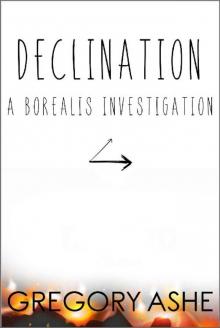 Declination
Declination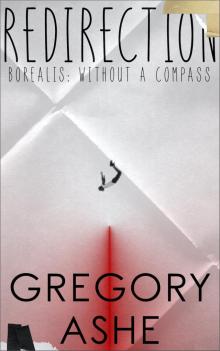 Redirection
Redirection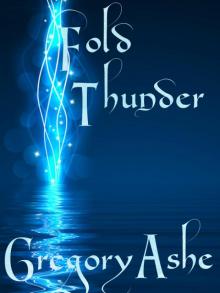 Fold Thunder
Fold Thunder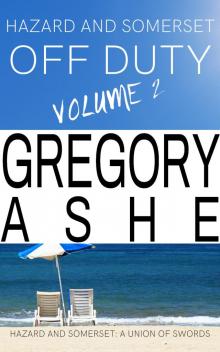 Hazard and Somerset
Hazard and Somerset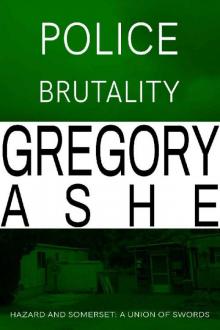 Police Brutality (Hazard and Somerset: A Union of Swords Book 2)
Police Brutality (Hazard and Somerset: A Union of Swords Book 2)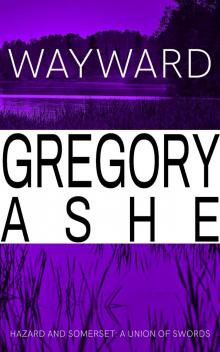 Wayward
Wayward The Same End (The Lamb and the Lion Book 3)
The Same End (The Lamb and the Lion Book 3)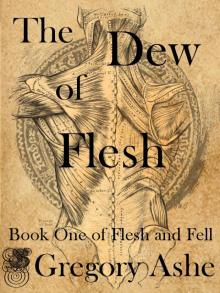 The Dew of Flesh
The Dew of Flesh The Same End
The Same End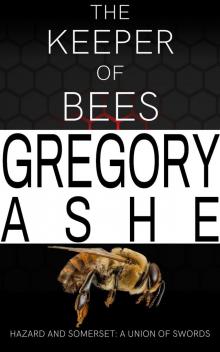 The Keeper of Bees ARC
The Keeper of Bees ARC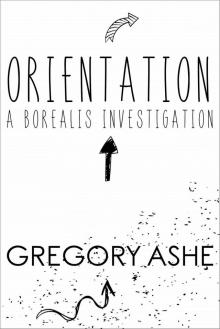 Orientation (Borealis Investigations Book 1)
Orientation (Borealis Investigations Book 1) The Indifferent Children of the Earth
The Indifferent Children of the Earth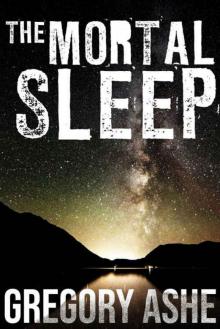 The Mortal Sleep (Hollow Folk Book 4)
The Mortal Sleep (Hollow Folk Book 4)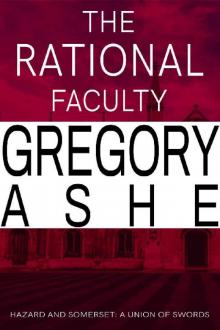 The Rational Faculty (Hazard and Somerset: A Union of Swords Book 1)
The Rational Faculty (Hazard and Somerset: A Union of Swords Book 1) The Weeping Lore (Witte & Co. Investigations Book 1)
The Weeping Lore (Witte & Co. Investigations Book 1)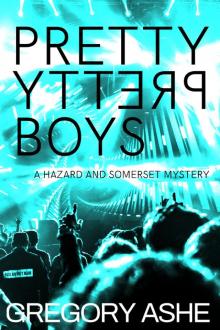 Pretty Pretty Boys
Pretty Pretty Boys Transposition
Transposition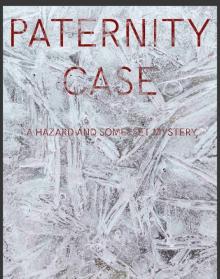 Paternity Case
Paternity Case